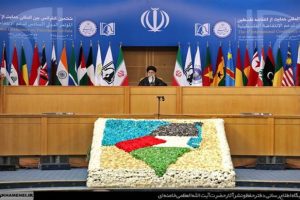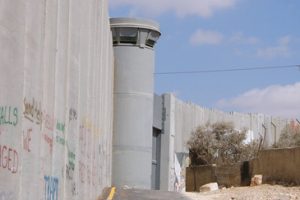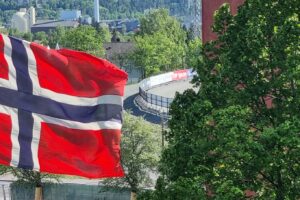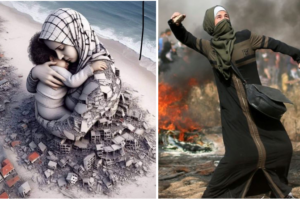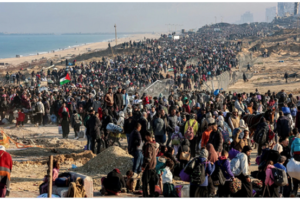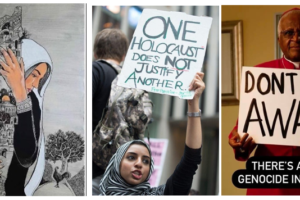I would like to discuss three questions in this respect; 1.) To bring Zionist war criminals to justice in national and international courts. 2.) The Right of Resistance. 3) The Organized Violation of International Humanitarian Law.
1.) To pursue Zionist war criminals (of Gaza?s 22 days? war) and bring them to justice in national and international courts.
War crimes are “violations of the laws or customs of war”; including murder, ill-treatment and ?wanton destruction of cities, towns and villages, and any devastation not justified by military necessity?. To any observer, with a certain degree of impartiality, it will be very clear that Israel has been committing war crimes in Gaza.
In several reports, from national and international humanitarian rights groups, it is clearly stated that Israel must have grossly violated international humanitarian law, including the IVth Geneva Convention on the Protection of Civilian Population in Times of Conflict and customary international law governing the conduct of hostilities. Some of these violations without any doubt constitute crimes under international law. In particular, the Israeli army has engaged in indiscriminate or disproportionate attacks and has failed in its legal obligation to spare civilians and civilian infrastructure from such attacks.
In opposition to ?spare civilians and civilian infrastructure?, a major objective of the Israeli attacks was to promote maximum damage to civilian life and devastate civilian infrastructure.
That objective was clearly stated by Shimon Peres, president of the Israeli Zionist state, announcing on Norwegian Television January14th that ?The Palestinians in Gaza deserve a hard blow?. This is clear speech indeed! Shimon Peres, head of the Israeli Zionist state, made no secret of the fact that the Israeli army was perpetrating an act of collective punishment of the Palestinian people of Gaza! Such a kind of operation is considered a war crime in accordance with international law.
The brutality and the character of Israeli Zionist war crimes have aroused people in most countries of the world, and have brought people into the streets in firm protest.
Persecuting War Criminals
National and international groups of lawyers are now demanding that the responsible persons ? that is: political and military leaders of the Israeli Zionist state ? be prosecuted and brought to justice. They call for the urgent establishment of an independent commission of investigation into all the alleged violations of international human rights and humanitarian law, which would bring to light the individual responsibilities involved and pave the way for mechanisms of accountability and redress. All parties to the IVth Geneva Convention have a legal obligation to institute such an investigation.
To deploy an international fact-finding mission under UN auspices, documenting the grave violations perpetrated in Gaza, would probably need the consent by the Security Council. It would probably be vetoed by the US.
There is a national way in which to bring the war criminals to court. In accordance with the Geneva Convention, Article 146, all contracting parties have a duty, stated in Article 1, to act in such cases.
?Each High Contracting Party,? as stated in Article 146, ?shall be under the obligation to search for persons alleged to have committed, or to have ordered to be committed, such grave breaches, and shall bring such persons, regardless of their nationality, before its own courts. It may also, if it prefers, and in accordance with the provisions of its own legislation, hand such persons over for trial to another.?
That means that any contracting party ? any signatory to the IVth Geneva convention ? is obliged to search for persons allegedly involved in war crimes, and bring them, regardless of their nationality, before its own court. Lawyers in several countries, Norway included, are now demanding of their governments that they search for ? and bring to justice ? suspected Israeli Zionist war criminals from Gaza.
Let me refer to some examples:
- The Belgian prosecuting authority in the year 2000 ordered the arrest for war crimes of Israeli Zionist leader Ariel Sharon. Due to this order of arrest, Sharon refrained from visiting Belgium.
- The Central Investigative Judge of the Spanish National Court decided in January 29 this year to treat a complaint concerning a crime committed in Gaza in 2002. A one- ton bomb aimed at a Hamas official was dropped by an Israeli army F-16, killing 14 Palestinian civilians and wounding some 150 others. The Spanish decision marks the launch of a judicial enquiry targeting seven Israeli Zionist officials, including former ministers and military commanders.
- In 2005, Israeli commander Brig. Gen. Doron Almog escaped arrest on war crime charges after receiving a tip-off at Heathrow Airport, London. An Israeli official had warned him not to leave the plane, as a UK court had issued a warrant for his detention.
- A group of lawyers in Norway are now demanding that Norwegian authorities should start the same procedures against perpetrators of the recent war crimes in Gaza as those directed against Ariel Sharon. Israeli Zionist leaders visiting Norway may then run the risk of being arrested, depending on the success of the lawyers.
Similar attempts to bring the Israeli Zionist war criminals to justice should be made also in other countries.
2.) The Right of Resistance and the Right of Armed Resistance to Combat against Occupiers.

the right to resist any occupation.
Modern international law states clearly that any people under foreign occupation have the right to resist occupation. This is a fundamental right also for the Palestinian people.
International law since the Second World War furthermore stresses that all people have the right to self-determination. The Palestinian people living under foreign occupation clearly have the right to resist that occupation, and to struggle for their self-determination.
UN General Assembly resolution 3089 of 7 December 1973 – ?Expresses once more its grave concern that the people of Palestine has been prevented by Israel from enjoying its inalienable rights and from exercising its right to self-determination.? The Israeli Zionist state is the occupier, preventing the Palestinian people from exercising its inalienable rights. The list of international resolutions and statements confirming this fact is long indeed.
UN General Assembly resolution 3070 of 14 December 1960 ?reaffirms the legitimacy of the people?s struggle for liberation from colonial and foreign domination and alien subjugation by all available means, including armed struggle.?
In this respect, and in the same resolution ?all Governments which do not recognize the right to self-determination and independence of (?) the Palestinian people? are condemned.
In accordance with those mentioned and similar resolutions issued by the UN General Assembly the Palestinian people have the right of resistance and the right of armed resistance to combat the Zionist state of Israel.
When it comes to Gaza, this territory is still de facto and de jure occupied by the Israeli Zionist state, oppressing and violating their basic human rights. In spite of the initial redeployment of troops and settlers from the area, the Israeli Zionist state retains effective control. To resist and combat the Israeli Zionist occupation of Gaza is legitimate and just.
The West Bank and Jerusalem ? the whole of Jerusalem! – are part of the occupied territories, as stated in numerous resolutions. The Palestinian?s right of resistance and struggle in those territories is very clear indeed.
What about the so-called ?Israel proper?: the Israeli Zionist state within the 1969 borders? A large part of that area was conquered by force by the Zionist forces in 1947/48. According to international law ?acquisition of territory by military conquest is inadmissible,? stated by the UN. This land still rightfully belongs to the Palestinian people. Even the establishment of the Israeli Zionist state in Palestinian land in general is contrary to international law, because it did not take into account the will and aspirations of the indigenous Palestinian people.
The Right of Return
The Palestinian people expelled by the Zionist entity have the right to return. This right is legally binding according to international law. UN General Assembly Resolution 194 of 11. December 1948 stresses ?the full respect for and realization of the inalienable rights of the Palestinian people (?) and the enjoyment by the Palestine Arab refugees of their right to return to their homes and property?. Those rights have been repeatedly reaffirmed by the Assembly since that date.
Imagine some four million Palestinians refugees, returning to their homes and properties in what is now the Jewish State of Israel, which is their right! Then that Israeli Zionist state would no longer exist.
The right of the Palestinian refugees to return to their homes and properties, is an inalienable right. According to international law, this right cannot be negotiated. In case an occupying power ? like Israel ? makes an agreement with representatives of the people occupied to the extent that the rights of that people are reduced, the agreement will not be valid. Representatives of an occupied people ? like the Palestinians ? cannot ?sell? the rights of their people during negotiations in which the other party is overwhelmingly strong, or as a result of pressure exerted by other powers. The defined rights of a people are inalienable and cannot be nullified by negotiations.
The right of resistance, the right to armed resistance ? and the right to return ? are basic rights of the Palestinian people.
3.) The Organized Violation of International Humanitarian Law in Occupied Palestinian Land.

and diminish the capacity and potential of the Palestinian people to
achieve self-determination and independence.
The latest violations of international humanitarian law as seen in Gaza and elsewhere, from the side of the Israeli Zionist state, is not accidental but deliberate. It is part of a systematic Israeli policy to expropriate and deinstitutionalize, and diminish the capacity and potential of the Palestinian people to achieve self-determination and independence.
The Israeli Zionist state has continuously disregarded UN resolutions and has violated the Geneva Conventions regarding occupied territories. The International Committee of the Red Cross, The United Nations Relief and Work Agency (UNRWA) and the UN Committee for Human Rights have, on several occasions, called on the Israeli Government to desist from such actions, in general with no result.
UN General Assembly has on several occasions ?strongly deplored? the measures taken by Israel in the occupied territories. The General Assembly Resolution 3089 of 7 December 1973 thus again stressed ?that the Israeli occupation authorities have persisted in adopting measures that obstruct the return of the displaced population to their homes and camps in the occupied territories ? including changes in the physical and demographic structure of the occupied territories, by the displacement of inhabitants, the transfer of population, the destruction of towns, villages and homes, and the establishment of Israeli settlements ? in violation of the provisions of the Geneva Convention relative to the Protection of Civilian Persons in Time of War, of 12 August 1949, as well as the pertinent United Nations resolutions?, and reaffirming that it considers those measures ?null and void?.
The same measures however, taken by the Israeli Zionist state, are still continuing even more, day by day.
This is because international resolutions and efforts do not face the real problem, which is Zionism. The policies of the Israeli Zionist state can only be understood within the context of Zionism, which includes goals of further development towards Greater Israel, and dispossessing the Palestinian people of all their major rights.
Zionism is the idea to be eliminated. And the Zionist process of oppressing and expelling the Palestinian people must be reversed.
International institutions with their statements and resolutions may be somewhat useful. But a real change can only come from the Palestinian people themselves, exercising their right of resistance, and being supported by all efforts by people and states committed to real peace and justice.










